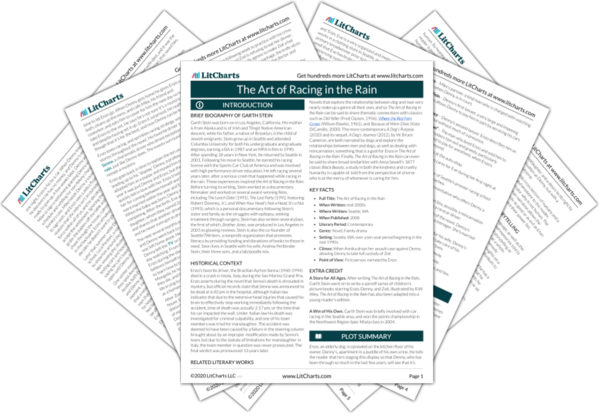The Art of Racing in the Rain is, at its core, a story about family and relationships. It delves into the relationships between lovers, spouses, parents and children, and parents and their adult children. It also questions what love is and what forms familial love can take.
Throughout the novel, relationships are explored primarily in terms of what happens when someone or something comes between an already existing relationship. This asks the reader to question the shape and strength of familial bonds. Some characters, like Eve, first come between an existing relationship (Enzo and Denny) before being integrated into the family. Love for Denny is what causes Enzo to accept Eve into his family, albeit begrudgingly—although Enzo later tries to make it closer, their relationship is relatively standoffish because he never forgives Eve for taking the primary spot in Denny's life. Other characters, like Trish and Maxwell, do nothing but try to come between Eve and Denny and later Denny and Zoë. Despite their desire to cut Denny out of their daughter and granddaughter's lives, neither Eve nor Zoë ever waver in their love for Denny. Love, in this sense, is what allows the relationships to flourish despite adversity. When the family is separated for the first time—Denny in the hospital with Eve, Zoë with her grandparents, and Enzo with Mike and Tony—Enzo comes to the realization that despite their separation and the chance occurrences that may try to tear them apart, his family would always be together thanks to the love they share.
Yet despite Enzo's touching realization about his own immediate family, the idea of family, and how families show their love to each other, is more nuanced and multifaceted when the immediate family contends with the desires of extended family. Despite Enzo's portrayal of Trish and Maxwell as pure evil, their custody suit for Zoë comes from a place of love and a desire to care for her the way they believe she should be cared for. They take offense to Denny's busy schedule and need to travel for races, and believe they could provide Zoë a better childhood with stability and a steady home life. In this way, money becomes a major factor in the way families in the novel show their love. Trish and Maxwell believe that they could better care for Zoë because they have the money to put her in a good private school and pay for her college, unlike Denny. Thus, they equate love with money and the things that money can buy. Denny's parents, absent for the majority of the text, also show their love through money. Denny lies for much of the text that his parents financed several races and trips to further his career, thereby fabricating that sense of love for the comfort of others. However, his parents come through in the end and take out a reverse mortgage on their house to pay for Denny's legal fees, which eventually reunites Denny and Zoë. The price for this help is that they get to meet Zoë, their granddaughter, for the first time. Forging an actually familial connection then becomes necessary for receiving parental love and care.
Throughout the course of the novel, Enzo comes to realize that family isn't something simple and unchanging. It moves and changes, and despite wildly differing conceptions of what love means, the novel suggests that family, in whatever form that might take, will come through and act in whatever way love means to them.
Love and Family ThemeTracker

Love and Family Quotes in The Art of Racing in the Rain
And while I greatly resented the attention Eve lavished on her unborn baby, in retrospect, I realize I had never given her a reason to lavish that same attention on me.
What Eve said was not out of line, as most dogs cannot help themselves... but that sort of thing doesn't apply to me.
But I hadn't a facile tongue. So all I could do was watch and feel empty inside; Eve had assigned me to protect Zoë no matter what, but no one had been assigned to protect Eve. And there was nothing I could do to help her.
I had always wanted to love Eve as Denny loved her, but I never had because I was afraid. She was my rain. She was my unpredictable element. She was my fear. But a racer should not be afraid of rain; a racer should embrace the rain.
"Sometimes I think you actually understand me," he said. "It's like there's a person inside there. Like you know everything."
I do, I said to myself. I do.
She rarely called me by my name. They do that in prisoner of war camps, I've heard. Depersonalization.
I marveled at them both; how difficult it must be to be a person. To constantly subvert your desires. To worry about doing the right thing, rather than doing what is most expedient.
"But I love you!" she howled, and then she was in an all-out crying fit, her eyes squeezed shut, her mouth contorted. "I love you!" she kept saying over and over. "I love you!"
I thought of Eve and how quickly she embraced her death once the people around her agreed to it; I considered the foretelling of my own end, which was to be full of suffering and pain, as death is believed to be by most of the world, and I tried to look away.
Tears ran down Denny's mother's cheeks during the entire encounter, raindrops spotting Zoë's flower-print dress.











